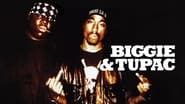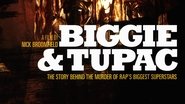benwell2
Biggie and Tupac is a Documentary on the deaths of Tupac Shakur and Biggie Smalls and the East Coast/, hip-hop/rap rivalry that happened in late 1996/1997. It has a very different style, and director Nick Broomfield is a very intrusive and un-forgiving documentarian. His unusual style puts me off of this documentary, and his constant repetitiveness and dull mono-tone voice adds insult to injury. Unlike a lot of documentaries Nick Broomfield is the main star in this documentary, and takes every opportunity to jump in front of the camera, and now and then throws in a rough piece-to-camera, describing what we have already just seen. However, there is some fantastic access, and I believe that Nick made the most of his contacts, and gained some fantastic access. His interviews with Tupac's mother, a very intense and truthful interview is just one of the fantastic moments in this film, as well as an extremely revealing interview with Biggies bodyguard, who reveals who he believes to of killed Biggie. From the amazing dangers taken, you can see that Nick Broomfield has a massive drive to make his documentary as revealing and factual as possible, and this is shown by the highly dangerous locations that they perspire to film in, one being one of the most notorious gun capitals in the east of America, and another being a high security prison. In both circumstances, Nick Broomfield fearlessly and intrepidly gets as much information as he can from local people and inmates, to get the broadest picture on the events as possible.While all these points are very impressive, you still cannot sway from the mindless boredom that Nick incites. His on screen demine is highly irritating. Another grudge I have for this movie is the lack of time. There is no natural progression between each interview, and the events jump from one to another, rather than unfolding as they actually did.
pwirth
Biggie and Tupac is a chronology of Broomfield's complete failure to unearth any interesting material on his subjects, totally overshadowed by his blandiose, wooden narration.I found his attitude and treatment of his subjects to be insufferable, from his attempts at pidgin English (akin to reading Dick and Jane novels aloud) to his unprepared, incompetent interviews (showing up and ambushing people, losing sound files, etc.) Broomfield has a unique talent for getting in the way of the story he is purporting to tell. He was more interested in hearing himself talk, and following his own blundering, as he put up increasing barriers between himself and his subjects.In addition, how does the director expect us to be engaged by the story, when it is clear he has no interest in hearing what people have to say? Ambush journalism fails when you are being aggressive without asking anything of import. He can't ask an interesting question, how can one expect him to spin a compelling narrative?This movie was a pathetic attempt by a director worth ignoring.
LCParkes
Anyone expecting a tawdry,shoddy sleazefest along the lines of "Kurt and Courtney" should be pleasantly surprised here- this is an excellent film.For a start, the conspiracy theory explored here is a far more credible one, and the evidence Broomfield turns up is very convincing in places. One has to wonder how genuine Broomfield's "camera on at all times" approach is, how much was created at the editing stage- he appears to get away with some very transgressive behaviour here on the basis of sheer amateurism, though it is clear the man has balls of iron. he thoughtlessly wanders through some of the worst neighbourhoods in LA and New York- in one classic scene his cameraman deserts him out of sheer fear, leaving him to manage a ludicrous prison interview with despotic Death Row records overlord Suge Knight alone. Irony being lost on Americans for the most part, Broomfield also manages to get away with some outrageous cheek- for instance asking Knight to deliver his "message for the kids" in a tone of smirking condescension.For the heads, there is some great, rare footage on offer- a teenage Biggie ripping up a street corner freestyle battle, hoods dancing on their cars at his funeral, an electrifying Snoop Dog calling out New York at the notorious 95 source awards....plenty in there for the hip hop fan, along with some vintage Biggie and (for some reason) Gang Starr on the soundtrack. Broomfield manages to talk to every major player in the drama, with the notable exception of Afeni Shakur- which also explains the lack of 2Pacs' music on the soundtrack.Despite its grim subject matter, there is much humour on offer here. In short, this is the best "rockumentary" in a very long time, and one that lingers in the mind for some time afterwards.Something of a triumph.
Matt-513
Having read numerous books on Tupac, from Kathy Scott's first book, to the Vibe Hardback interviews and Frank Alexander's accounts, I thought there wouldn't be much more this docu-film could tell me about the murders of Christopher Wallace (aka The Notorious B.I.G.) and Tupac Shakur. I was wrong. Nick Broomfield is endlessly persistent in his attempts to interview all the leading figures to do with the case. The main coups are the two former cops who he interviews. One, a former member of the FBI undoubtadely puts his own life at risk as he talks about Documents that could prove the guilt of certain members of the LAPD involved in the Biggie murder, as well as the inevitable storm it would cause and the demand from the public for a full internal investigation. Not to mention completely stripping the LAPD, Las Vegas Inforcement and FBI of their credibility. He mentions being offered $250,000 for the documents, but as Broomfield cleverly fires the questions in, each recepient keeps their cards close to their chest and each take care in their answers. None more so than the guy in the Prison (forgot his name!) who is incarcerated for impersonating a Lawyer, and was involved in transferring funds from Phoenix for Suge Knight and various members of LAPD who worked "off duty" for the Death Row Records CEO. He is interview in his cell, with his lawyer present and is constantly reminded that he only has constitutional immunity, but not state. Even still he admits to carrying the "blood money". Both murders were well planned hits, orchestrated by Suge Knight. The motive? Money. Suge owed Tupac $10 million in record sales. Suge was a gangster in real terms, not just his media persona (drug trafficking, crooked cops and FBI, you name it). He panicked when he found out Tupac wanted to Audit Death Row for the money, and that Tupac wanted out of Death Row and had other offers. Cops killed Tupac in Las Vegas on Sept 7th 1996 in a smooth professional style hit organised by Knight. To take the heat off, he then organised the Biggie hit 6 months later. It was simply a smokescreen, and capitalised on a feud orchestrated by Knight some 12 months prior at a Music Awards Ceremony. Tupac had been convinced (wrongly) in Jail that Biggie had set up the hit in 1994 on Tupac. In fact, Tupac, while in Jail after the first attempt on his life, had been set up by undercover FBI agents in Jail, who filled his head with nonsense about Bad Boy. Biggie, in contrast was mild mannered. As was Puffy. They are not gangsters. They never will be, they never have been. Biggie's rapping about hardship when growing up was his media image, in fact it was rather more middle class, as described by his mother Valetta Wallace, who was interviewed on numerous occasions during the film. I really could go on, but if you watch the film then you'll find out. There is some good rare footage of Pac in his prime. He still remains to me one of the all time talented people ever to walk the planet (actor, rapper, poet), and Biggie was just a good guy who made some excellent music. If you know Pac's lyrics, you'll know they are quite brilliant even when "riding on his enemies". His public image was of a ghetto thug, and his upbringing certainly should have moulded him that way. But in actual fact he was articulate, hugely talented and sensitive. Something you just don't see. So go see the film, and the very interesting visit to Yule Creek Pen to see Suge (how they managed it I'll never know!) Nick Broomfield is excellent, although you wonder how he gets so much info for a little white British guy doing his own film, particularly when lives could be at stake. One other good moment is when he visits Biggie's bodyguard (who is about 6ft 7) and he identifies the murderer. And yes I will stop now. GO SEE!




